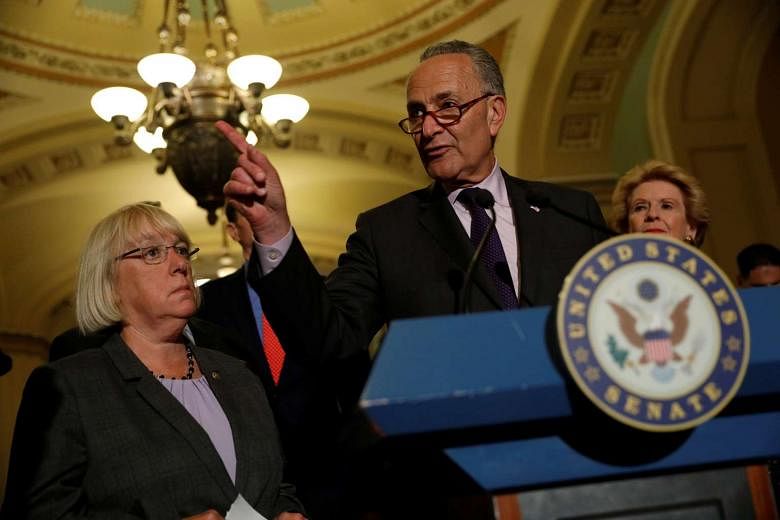WASHINGTON (WASHINGTON POST) - On a squeaker of a vote, the Senate began an extraordinary debate on Tuesday over profound philosophical and practical changes to the nation's healthcare system - without knowing what the legislation would be.
Based on what senators of both parties were saying late Tuesday, here are some of the main plans that are likely to be debated and potentially voted on in coming days.
Better Care Reconciliation Act
This is the main legislation that the Senate's Republican leaders have devised to get rid of much of the Affordable Care Act (ACA), better known as Obamacare, and substitute a more conservative set of health policies. Originally introduced on June 26, it is now in its third version and is almost certain to be altered further.
The Better Care Reconciliation Act (BCRA) would eliminate central features of the current law, which a Democratic Congress pushed through in 2010. It would end federal penalties for people who violate the current law's requirement that most Americans carry health insurance and for employers with 50 or more workers who do not offer health benefits. It also would cut the subsidies that help more than eight in 10 consumers afford the monthly premiums of health plans they buy through the ACA's insurance marketplaces.
The plan would substitute a different form of tax credits, smaller for many people because they would be tied to skimpier health plans. Unlike the ACA subsidies, however, the proposed credits would be available to people below the federal poverty line.
After two years, the Bill also would abolish a different ACA subsidy that now helps about seven million lower-income consumers afford their coverage deductibles and other out-of-pocket expenses.
Medicaid, the joint state-federal programme of health insurance for the poor, would be transformed in two ways. The expansion of the programme undertaken by 31 states under the ACA would be phased out in a few years. More fundamentally, its half-century tradition as an entitlement - with the government paying a certain share of the costs in each state, no matter how high - would be replaced by per-person caps or block-grant funding. Either is predicted to squeeze the federal payments as time goes on.
Cruz amendment
Senator Ted Cruz has been touting a change to the Better Care Reconciliation Act that would enable insurers largely to ignore ACA rules requiring health plans sold to individuals and small businesses to cover specific benefits. Insurers could jettison maternity care, mental-health treatment and other benefits as long as they sell at least one health plan that includes them.
Cruz has said that this change would lead to lower insurance rates for healthy people, and analysts suggest that it would do so. However, analysts also expect that people who need more medical care would face significantly higher prices because health plans' "risk pools" would be splintered between healthier and sicker groups.
This amendment has been unpopular with GOP centrists in the Senate.
Portman amendment
Senator Rob Portman comes from a state that expanded Medicaid and has been outspoken in predicting that the BCRA eventually would starve the programme and leave more people uninsured.
He now has come up with a variation of an idea that the Trump administration's top health officials have been heavily lobbying expansion states to embrace: Tax credits that people on Medicaid would receive to buy private health plans. Many of the governors targeted have said no to the administration's offer, predicting that such low-income residents still could not afford the private coverage.
Portman's amendment would provide US$100 billion to help those people cover their deductibles and other expenses if they switched out of Medicaid, and it would let states set up such arrangements without needing special federal approval.
Repeal-only
The only repeal Bill ever to pass Congress would have left intact some popular ACA insurance rules, such as letting young adults stay on their parents' health plans to age 26. But the 2015 measure would have ended the law's coverage mandates, its subsidies for most people buying health plans through the ACA marketplaces and the law's Medicaid expansion.
Senator Rand Paul has championed this kind of repeal without substitutes, viewing it as a purer version of ACA repeal and thus more acceptable. He provided a crucial vote to start the healthcare debate on Tuesday after being promised that the chamber would vote on this measure. Other Republicans, however, abandoned the idea of a repeal-only Bill months ago, believing it would upend coverage for millions of people and devastate insurance markets.
A 'skinny repeal'
Adding a new phrase to the crowded lexicon of healthcare policy, "skinny repeal" would abolish just three parts of the ACA: The individual and employer insurance requirements, plus a tax on medical-device manufacturers.
A close variant of this surfaced two years ago in the House, and congressional budget analysts estimated at the time that 15 million fewer Americans would have insurance coverage "most years" as a result.
The idea is now as much tactics as policy. A slimmed-down repeal plan probably would surface on the Senate floor as an amendment if the chamber is unable to pass a fuller demolition of the law. It would buy the Senate's GOP leaders more time because its passage would lead to a conference committee with the House.
Negotiations between lawmakers of the two chambers could then continue past Congress' August recess, preserving the ability of McConnell and other GOP leaders to keep searching for a health-policy formulation that could garner the support of enough members of their caucus.

